
Kansas Opioid and Stimulant Conference
November 28, 2023
8 a.m. – 5 p.m.
Hyatt Regency Wichita
2023 Graphic Recordings from KU CPPR
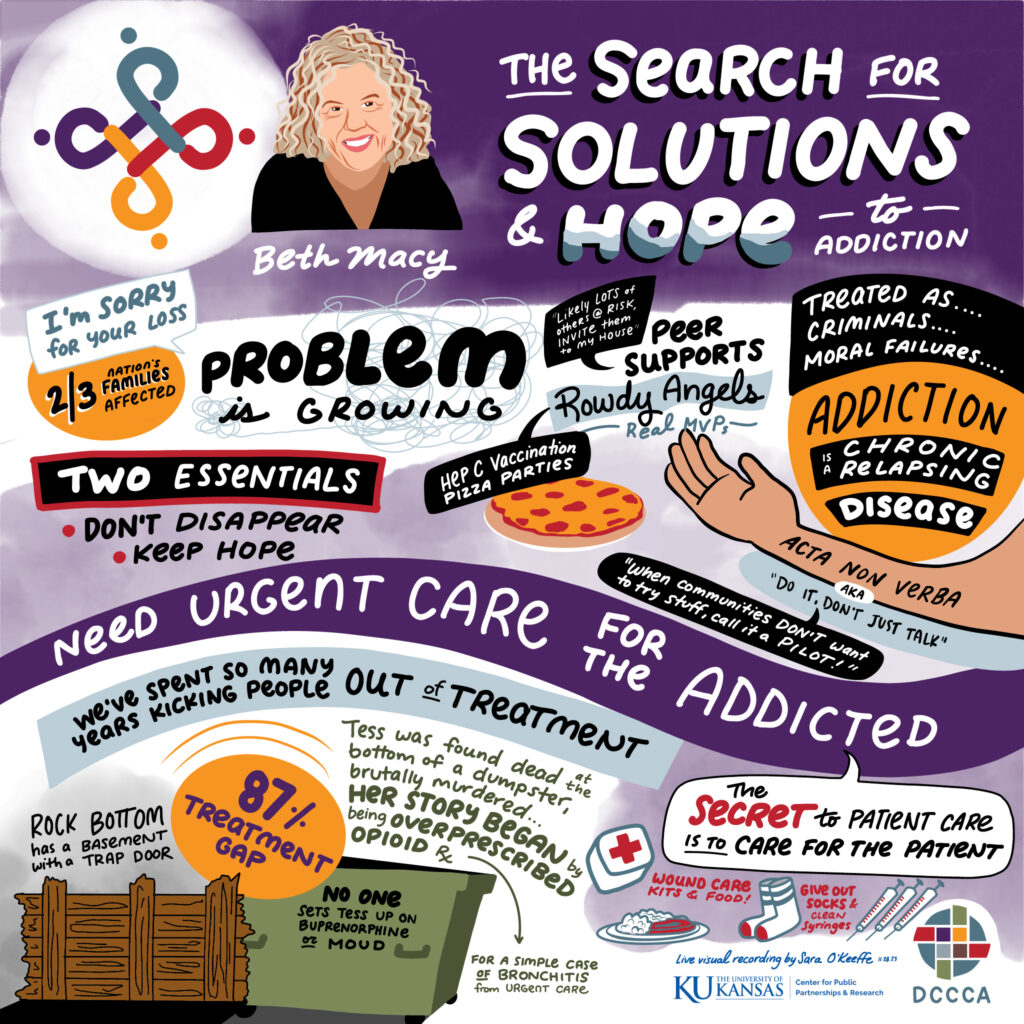
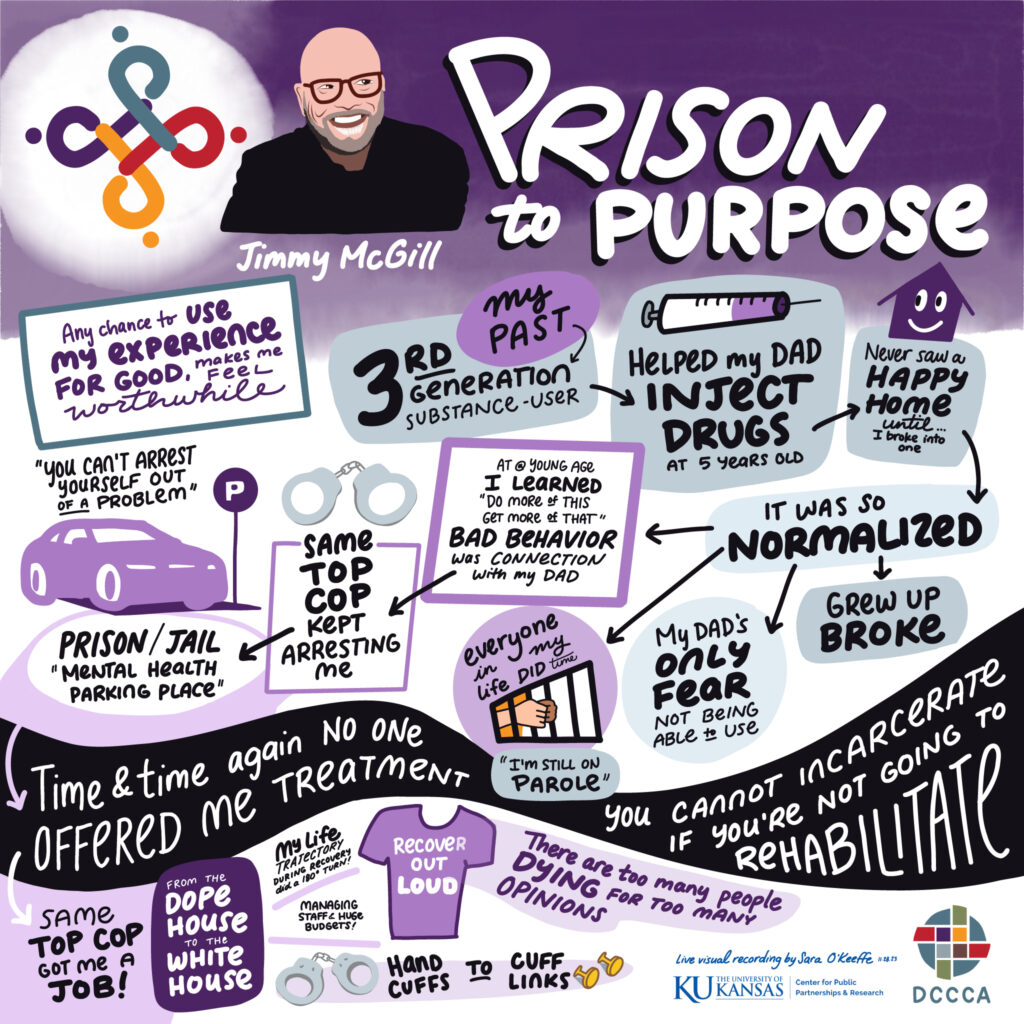
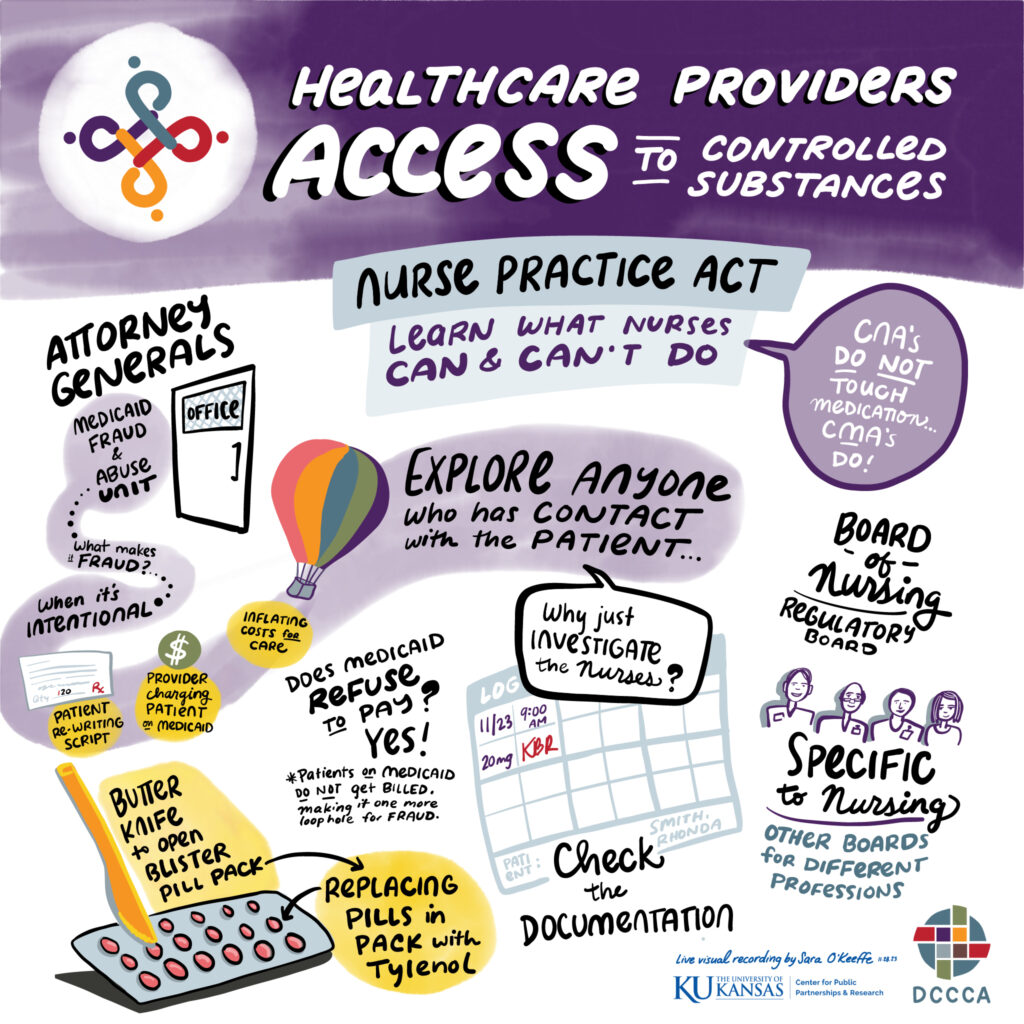
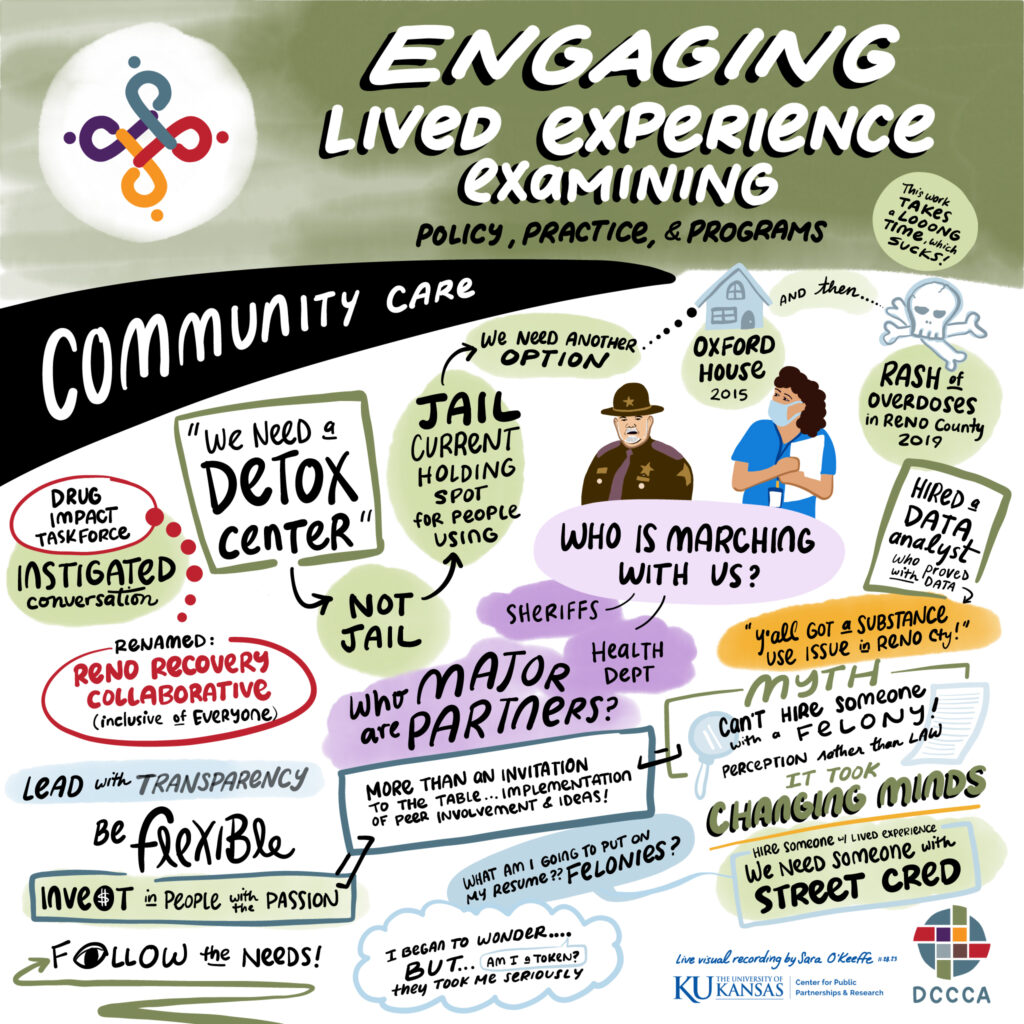
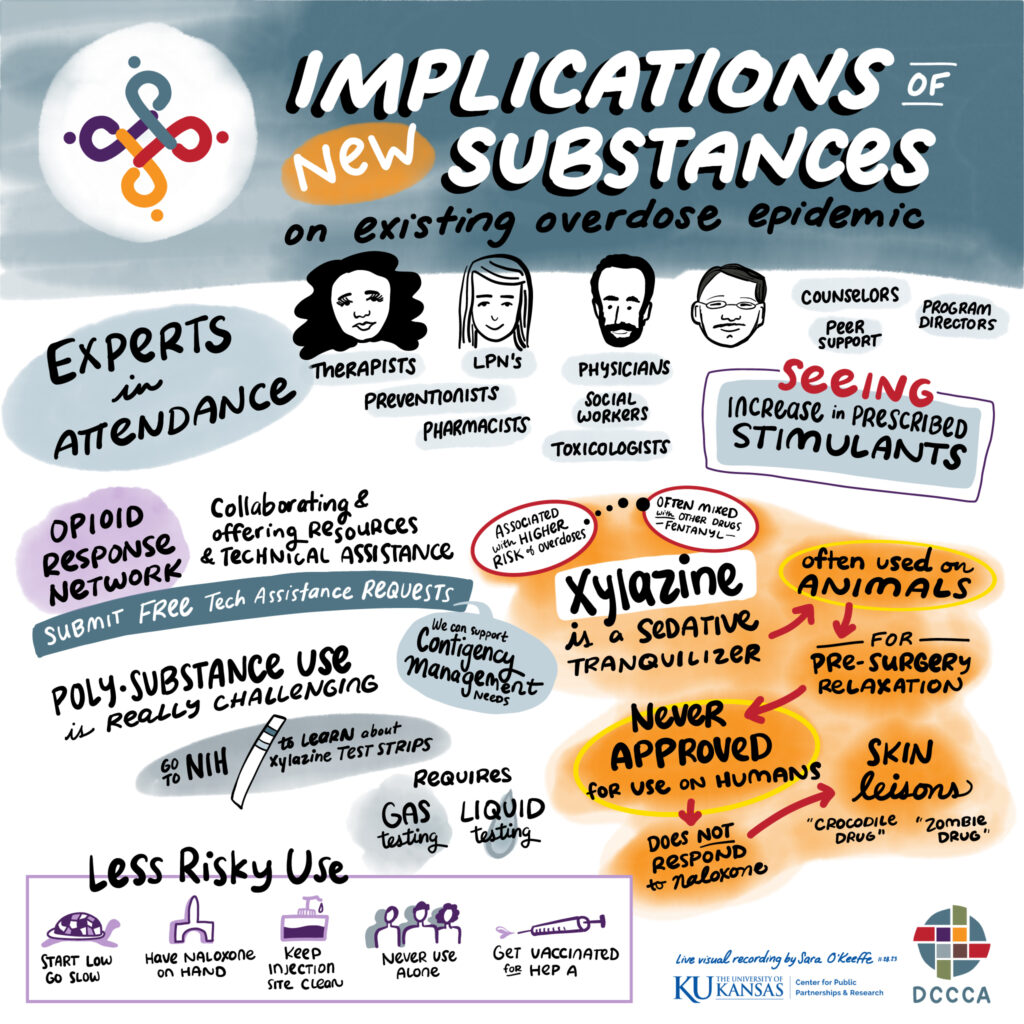
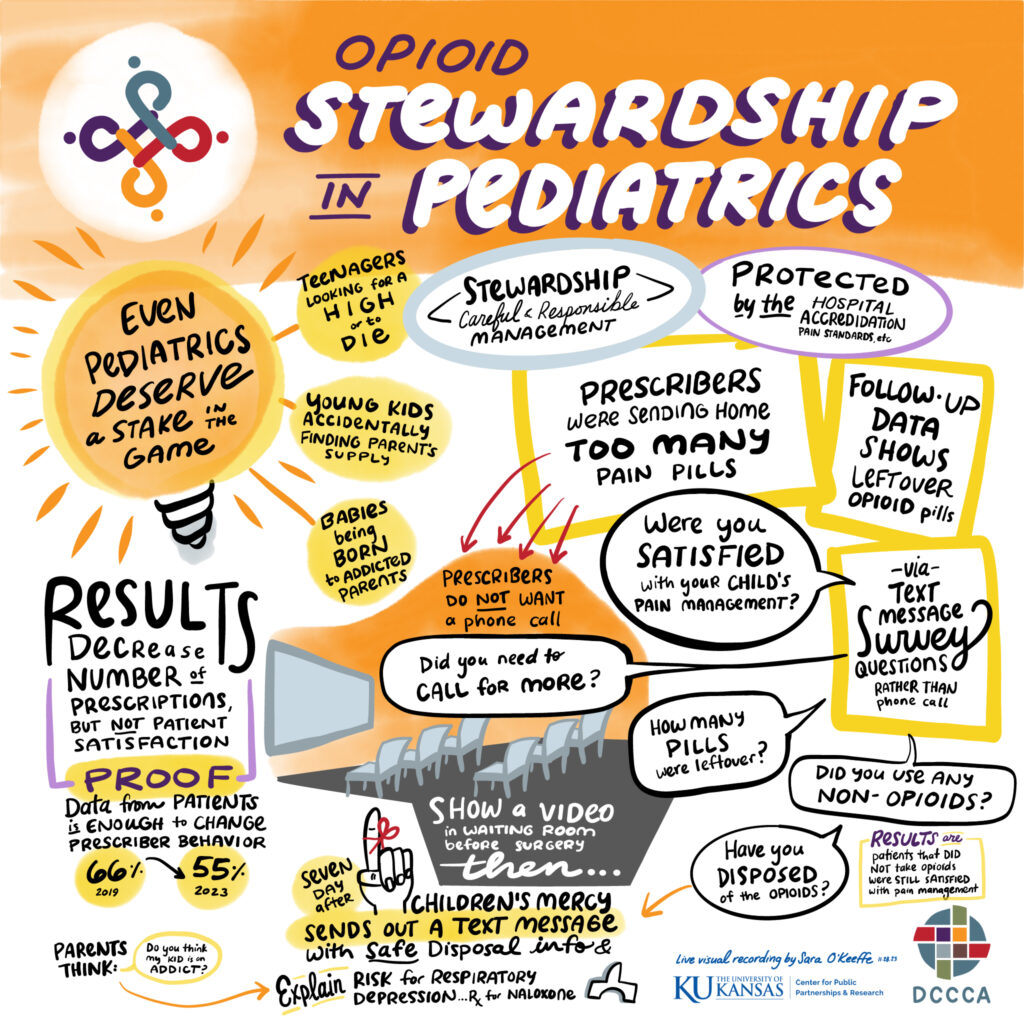
8:00am – 5:00pm
Registration Opens at 7:30am
7:30 – 8:30 Registration and Continental Breakfast
8:30 – 10:00 Welcome and Keynote Speakers
Raising Lazarus: The Search for Solutions and Hope to Addiction, The #1 Destroyer of Families in Our Lifetime
Beth Macy
Presentation File
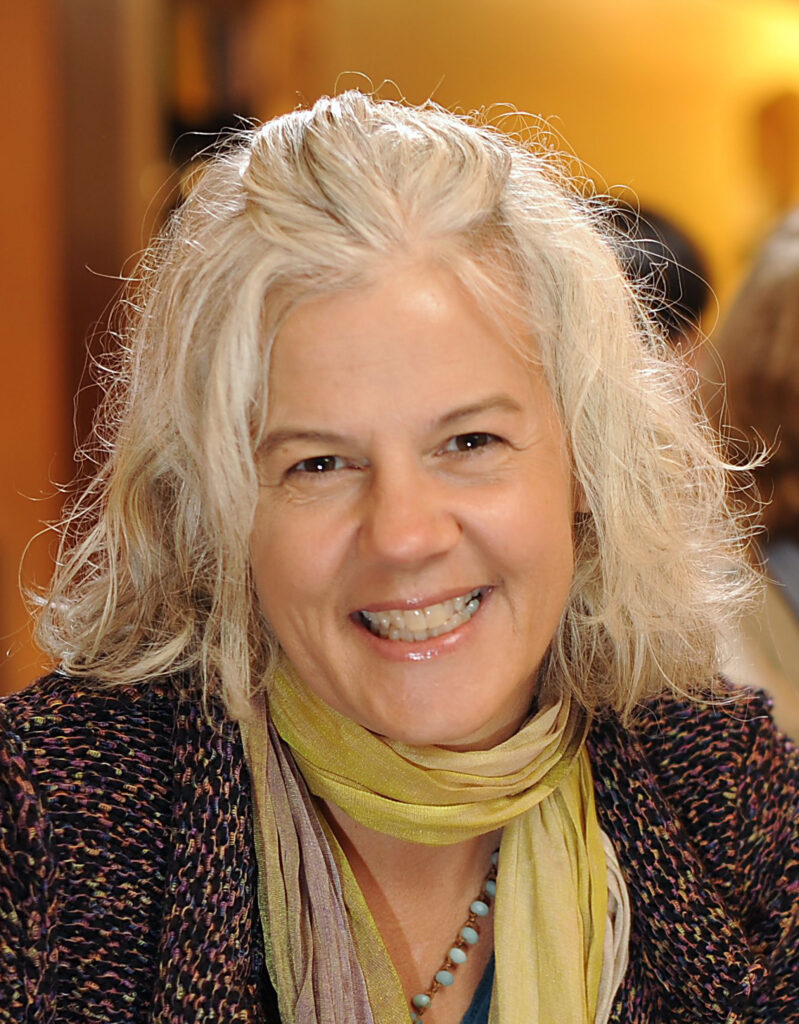
Beth Macy is a Virginia-based journalist who writes about outsiders and underdogs. Raised poor in a small Ohio community, she is the award-winning author of three New York Times bestselling books examining rural communities left behind by corporate greed and political indifference. Her first book, Factory Man, explored the aftermath of globalization and won a J. Anthony Lukas Prize. Dopesick was short-listed for the Carnegie Medal, won the L.A. Times Book Prize for Science and Technology, and was described as a “masterwork of narrative nonfiction” by The New York Times.
Dopesick was made into a Peabody- and Emmy Award-winning Hulu series; Macy was an executive producer and cowriter on the show. Her 2022 book, Raising Lazarus: Hope, Justice, and the Future of America’s Overdose Crisis, was a follow-up to Dopesick and explored on-the-ground solutions to the nation’s drug epidemic.
A 2010 Nieman Fellow for Journalism at Harvard and a 2023 Guggenheim Fellow, Macy has also written for The New York Times, The Wall Street Journal, The Atlantic, and The Washington Post. Her next book, Paper Girl, is a combination memoir and reported examination of the rural-urban divide told through the lenses of declining upward mobility, political polarization, and the decimation of local and regional news.
10:15 – 11:00 Breakout Session 1

Oklahoma Harm Reduction Campaign
Brian Barnes, Principal, Ghost Agency
Bonnie Campo, Senior Director of Public Relations, Oklahoma Department for Mental Health and Substance Abuse Services
During this workshop, participants will learn more about harm reduction efforts in Oklahoma, including an overview of the issue, message research, the strategy and approach, implementation of the vending machine tactic, and results to date.

How K-TRACS Can Impact Clinical Decision-Making
Gayle Donaldson, Assistant Director, Kansas Board of Pharmacy
LaTonyua Rice, PharmD
The Kansas prescription drug monitoring program, K-TRACS, is a valuable clinical decision-making tool for healthcare providers. This session will focus on CDC best practice recommendations for using K-TRACS and prescribing opioids, reviewing features of K-TRACS patient prescription history reports and current controlled substance prescribing trends.
Presentation File

Alternate Pathway to Recovery: Educate, Employ, Empower
Judy Reusser, NexStep Unlocked Counselor/Coordinator, Goodwill Industries of Kansas
Vickie Donaldson, Student Success Leader, Goodwill Industries of Kansas
Lauren Soliday, Director of Mission Initiatives Goodwill Industries of Kansas
The NexStep Alliance Unlocked program partners with Goodwill Industries and WSU Tech to offer a high school diploma with college trades. Students experience real transformation: education, employment and empowerment. With strategic community support, the process creates an environment where students have hope toward living sober without regrets.
Best Practices for Families Affected by Substance Use Disorder
Jennifer Gassman, Kansas Children’s Service League
Mike Parsons, DCCCA
Participants will learn about families impacted by substance use disorder. The course identifies factors which create an environment in which substance use endangers the well-being of children. It will discuss best practices for working with families and community collaboration to provide safe environments for children. Lived experiences will be shared.

Healthcare Providers Access to Controlled Substances
Lauren Wolf, Program Integrity Manager, Aetna Better Health of Kansas
The most common drugs diverted from healthcare facility settings are opioids. This presentation will aid law enforcement in tips for the investigation into allegations of fraud, waste and abuse as it pertains to healthcare providers access to controlled substances, particularly those in Long Term Care Facilities.

Community Perception on Opioid Use Disorders: Brains, Bias, and Best Practices – Part 1
Mirna Herrera, Regional Behavioral Health Advisor, SAMHSA
Jennifer Wolfe-Brown, CPS and EPICC/Comcare Program Director
This session will present national trends on Fentanyl, Xylazine, and the impacts of Opioids on behaviors. As we listen to the story of someone with personal lived experience, participants will identify how stigma affects treatment and explore ways to shift attitudes. We will also discuss overdose identification and Naloxone administration.
11:15 – 12:00 Breakout Session 2

Implications of New Substances on the Existing Overdose Epidemic: Examining Xylazine Effects on the Midwest and Across the Country
Holly Hagle, PhD, Associate Research Professor, University of Missouri – Kansas City
Lisa Carter, MS LPC LCAC, Co-Director, Mid-America Addiction Technology Transfer Center (ATTC)
Sherrie Watkins, LMSW, Regional Coordinator, Opioid Response Network
Examine the current and emerging trends that have impacted the drug overdose epidemic including the effects of Xylazine within the Midwest states (Kansas, Missouri, Iowa, and Nebraska). We provide an overview of the current trends, look at data within the Midwest and provide resources that providers can use.
Presentation File

Pharmacy’s Role in Opioid Misuse: Prevention, Harm Reduction, and Recovery
Amanda Applegate, PharmD, BCACP, Kansas Pharmacists Association
Tessa Schnelle, PharmD, DPLA, Kansas Pharmacists Association
Pharmacies can play a key role in helping people at risk for or experiencing opioid use disorder, especially when legal prescriptions are involved. This presentation will review currently available options for prevention, harm reduction, and treatment in Kansas, as well as examine evidence-supported best practices available in other states.
Presentation File

Overdose Data to Action in Kansas: Reflections on Progress at the Local Level
Angela Huffman, Kansas Department of Health and Environment, Bureau of Health Promotion
Aonya Barnett, Program Director, Safe Streets Wichita
Julie Gibbs, Administrative Director, Riley County Health Department
Seth Dewey, Health Educator, Reno County Health Department and Kansas Recovery Network
Lynette Redington, Director, Harvey County Health Department
Community leaders will share compelling stories and experiences stemming from their participation in the Kansas Overdose Data to Action Program and their work combating the opioid and drug overdose crisis. Gain valuable insights as panelists discuss innovative approaches and successful outcomes, inspiring change in our state.

Using the Transformational Power of Connection, Physical Wellness, and Restorative Justice to Reduce Opioid Use
Katie Heinrich, Senior Researcher, The Phoenix
Maria Nelson, Program Manager, The Phoenix
David Howard, Officer, Wichita Police Department
Officers from Sedgwick County Police Department lead programs at The Phoenix. The majority of Phoenix members report positive outcomes in several areas 3-months after engagement, and many of those who report use of opiates have previously been charged with a crime. This presentation will discuss this work.

Community Perception on Opioid Use Disorders: Brains, Bias, and Best Practices – Part 2
Mirna Herrera, Regional Behavioral Health Advisor, SAMHSA
Jennifer Wolfe-Brown, CPS and EPICC/Comcare Program Director
This session will present national trends on Fentanyl, Xylazine, and the impacts of Opioids on behaviors. As we listen to the story of someone with personal lived experience, participants will identify how stigma affects treatment and explore ways to shift attitudes. We will also discuss overdose identification and Naloxone administration.
ASAM Criteria, Treatment Placement and Clinical Documentation
Emily Swanzy, Manager of Clinical Services, Carelon Behavioral Health
This presentation will provide an overview of ASAM Criteria, including what it is and how it is used in the determination of appropriate Substance Use Disorder treatment placement for both adolescents and adults.
Presentation File
12:00 – 1:20 Lunch – Provided
1:00 – 1:20 SAMHSA Update
SAMHSA Update –
Kim Freese, SAMHSA Regional Administrator
1:30 – 2:15 Breakout Session 3

Fentanyl Test Strip Distribution in the State of Kansas
Paul Hunt, Opioid Project Manager, KDADS
The presentation will be a description of the Fentanyl Test Strips Distribution program. The audience will learn about the historical legal challenges of Fentanyl test Strips being legalized in Kansas, basics of how the FTS work, how they can protect people who use drugs and how this provides an opportunity to reduce Opioid Overdose Deaths in Kansas.
Factors Affecting Types of Technical Assistance Requests Submitted to the Opioid Response Network
Yifei Liu, PhD, UMKC School of Pharmacy
An-Lin Cheng, PhD, UMKC School of Medicine
Holly Hagle, PhD, UMKC School of Nursing and Health Studies
The Opioid Response Network responds to local needs in the prevention, treatment, and recovery of opioid and stimulant use disorders. These needs are submitted through technical assistance requests, such as activities to take and types of requests. The presentation is to examine factors affecting types of technical assistance requests.

Leveraging Timely Data to Improve Physical and Behavioral Health Care for Re-Entering Citizens
Jessica Johnson, Director Behavioral Health and Wellness, CareSource
Cross-referencing physical and behavioral health information with timely criminal justice data affords SUD providers, jails, and other entities insight into the needs of the population involved with the criminal legal system, allowing targeted resource allocation and support. Find out more about trends, use cases, and outcomes during this informative session.
Presentation File

Opioid Stewardship in Pediatrics
Elizabeth Edmundson, PhD, RN, NE-BC, Opioid Stewardship Program Manager, Children’s Mercy Hospital
In some ways, the opioid epidemic affects pediatric organizations differently than adult organizations. Upon developing our Opioid Stewardship program, our organization targeted two risk mitigation strategies: Patient/Family education and prescribing. This presentation is a review of outcomes demonstrating our successful journey.
Presentation File

Meet in the Middle: A Data Framework for Collaborative Public Health/Public Safety Initiatives
Kelly Firesheets, VP Strategy and Partnerships, Cordata Healthcare Innovations
This session will offer a practical framework for managing and collecting data as part of law enforcement and public health collaborations that address addiction and overdose deaths. This session will provide frameworks for evaluating collaborative overdose response, describe barriers and facilitators to collaboration, and offer successful frameworks for data.
Presentation File

Treatment and Recovery Lived Experience Peer Panel
Chasity Shaffer, DCCCA
Nick Casarona, HRADAC
Thomas Simmons, Reno County
Karma Lohrenz, Bert Nash
This presentation will be based on lived experience with addiction and recovery. Presenters will share their personal journey through active addiction and recovery.
2:45 – 3:30 Breakout Session 4

Trends in Kansas Overdose Mortality
Scott Johnston, Epidemiologist, Kansas Department of Health and Environment
An overview of the most recent trends in opioid and stimulant overdose mortality among Kansans, specifically looking at the topics of polysubstance use, descriptive statistics of disparately impacted geographic areas and demographic groups, and associations between county-level overdose mortality and various social vulnerability indicators.
Engaging Lived Experience: Examining Policy, Practice, and Programs
Seth Dewey, Health Educator, Reno County Health Department and Kansas Recovery Network
Megan Gottschalk, Assistant Director of Community Health, Reno County Health Department
Candace Davidson, Health Promotion and Education Supervisor, Reno County Health Department
Tonya Culp, Health Educator, Reno County Health Department
Together we will examine the benefits of having individuals with lived experience as staff in the public health arena, the shift in internal policies that might need to be reviewed, the practices that can be adopted, and programs that can be implemented that benefit local health departments and our communities.
Presentation File

Overdose Fatality Review: Public Health and Public Safety Focused Interagency Collaboration for Prevention
Nava Bastola, ORS Program Coordinator and Overdose Fatality Review Specialist, CDC Foundation
DJ Gering, Public Health Analyst, CDC Foundation
Todd Hixson, Drug Intelligence Officer, Midwest HIDTA
Overdose Fatality Reviews (OFRs) are multidisciplinary teams that review overdose deaths to provide recommendations for overdose prevention. This presentation will discuss how local communities can leverage the Overdose Response Strategy (ORS) network for support and subject matter expertise in public health and public safety, highlighting national tools and assistance available.
Presentation File

Deflection – What is it, and why your community should be doing it
Koren VanderWeele, Program Manager, TASC’s Center for Health and Justice
Carey Deacon, Program Director, Alamosa, Colorado
John Sherwin, Chief of Police, Fairbault, Minnesota
This panel will provide an overview of deflection and pre-arrest diversion and highlight how these initiatives promote community safety, reduce recidivism, and streamline the use of police funding and resources. This panel will also explore the benefits and challenges of implementing deflection and pre-arrest diversion initiatives in rural communities.
Presentation File
Harm Reduction Treatment and the Impact of the Fentanyl Crisis on MAT
Stacy Chamberlin, Program Director, BHG Lawrence
This presentation will show how the harm reduction model can be effective in treating individuals with an opiate addiction. The presenters will explain different therapies used by clinicians to engage patients. The presentation will include information on the fentanyl epidemic and the impact on patients served with Medication Assisted Treatment.
Recovery-Oriented Systems of Care: Sharing Hope Through Community Space and Recovery Housing in Rural Communities
April Jackson, Director of Addiction Prevention and Recovery Resources, Thrive Allen County
Charlie Harding, Peer Mentor/RH Manager, Thrive Allen County
We are sharing hope for recovery in rural communities through peer mentorship, community service and recovery housing. SEK Recovery Housing opened its doors in March 2021 to community members in recovery and those seeking recovery from substance misuse. There are many pathways to recovery, but prevention and community is a priority in this successful program. During this session, participants will learn about evidence-based recovery programs to support abstinence and lifestyle change, how to remove barriers to treatment access and recovery programs, and harm reduction methods as a pathway to recovery.
Presentation File
3:45 – 5:00 Closing Remarks and Keynote Speaker
From Prison to Purpose
Jimmy McGill
Presentation File

Overcoming a lifetime of incarceration and twenty-three years of drug addiction, author and speaker Jimmy McGill has defied the stigma of his criminal history and found his purpose. His childhood was marked by trauma, but what should have destroyed him is now being used to transform reentry and recovery awareness across the country. His book, “From Prison to Purpose,” is a detailed account of his journey to sustained recovery. McGill is a nineteen-time convicted felon that has gone from six trips to state prison to becoming the first parolee to hold a state position as the Director of Peer Services for the Arkansas Department of Human Services. McGill received a full pardon from Governor Asa Hutchinson in May of 2022.
Sessions by Track

Oklahoma Harm Reduction Campaign
Brian Barnes, Principal, Ghost Agency
Bonnie Campo, Senior Director of Public Relations, Oklahoma Department for Mental Health and Substance Abuse Services
During this workshop, participants will learn more about harm reduction efforts in Oklahoma, including an overview of the issue, message research, the strategy and approach, implementation of the vending machine tactic, and results to date.
Implications of New Substances on the Existing Overdose Epidemic: Examining Xylazine Effects on the Midwest and Across the Country
Holly Hagle, PhD, Associate Research Professor, University of Missouri – Kansas City
Lisa Carter, MS LPC LCAC, Co-Director, Mid-America Addiction Technology Transfer Center (ATTC)
Sherrie Watkins, LMSW, Regional Coordinator, Opioid Response Network
Examine the current and emerging trends that have impacted the drug overdose epidemic including the effects of Xylazine within the Midwest states (Kansas, Missouri, Iowa, and Nebraska). We provide an overview of the current trends, look at data within the Midwest and provide resources that providers can use.
Presentation File
Fentanyl Test Strip Distribution in the State of Kansas
Paul Hunt, Opioid Project Manager, KDADS
The presentation will be a description of the Fentanyl Test Strips Distribution program. The audience will learn about the historical legal challenges of Fentanyl test Strips being legalized in Kansas, basics of how the FTS work, how they can protect people who use drugs and how this provides an opportunity to reduce Opioid Overdose Deaths in Kansas.
Factors Affecting Types of Technical Assistance Requests Submitted to the Opioid Response Network
Yifei Liu, PhD, UMKC School of Pharmacy
An-Lin Cheng, PhD, UMKC School of Medicine
Holly Hagle, PhD, UMKC School of Nursing and Health Studies
The Opioid Response Network responds to local needs in the prevention, treatment, and recovery of opioid and stimulant use disorders. These needs are submitted through technical assistance requests, such as activities to take and types of requests. The presentation is to examine factors affecting types of technical assistance requests.
Trends in Kansas Overdose Mortality
Scott Johnston, Epidemiologist, Kansas Department of Health and Environment
An overview of the most recent trends in opioid and stimulant overdose mortality among Kansans, specifically looking at the topics of polysubstance use, descriptive statistics of disparately impacted geographic areas and demographic groups, and associations between county-level overdose mortality and various social vulnerability indicators.

How K-TRACS Can Impact Clinical Decision-Making
Gayle Donaldson, Assistant Director, Kansas Board of Pharmacy
LaTonyua Rice, PharmD
The Kansas prescription drug monitoring program, K-TRACS, is a valuable clinical decision-making tool for healthcare providers. This session will focus on CDC best practice recommendations for using K-TRACS and prescribing opioids, reviewing features of K-TRACS patient prescription history reports and current controlled substance prescribing trends.
Presentation File
Pharmacy’s Role in Opioid Misuse: Prevention, Harm Reduction, and Recovery
Amanda Applegate, PharmD, BCACP, Kansas Pharmacists Association
Tessa Schnelle, PharmD, DPLA, Kansas Pharmacists Association
Pharmacies can play a key role in helping people at risk for or experiencing opioid use disorder, especially when legal prescriptions are involved. This presentation will review currently available options for prevention, harm reduction, and treatment in Kansas, as well as examine evidence-supported best practices available in other states.
Presentation File
Leveraging Timely Data to Improve Physical and Behavioral Health Care for Re-Entering Citizens
Jessica Johnson, Director Behavioral Health and Wellness, CareSource
Cross-referencing physical and behavioral health information with timely criminal justice data affords SUD providers, jails, and other entities insight into the needs of the population involved with the criminal legal system, allowing targeted resource allocation and support. Find out more about trends, use cases, and outcomes during this informative session.
Presentation File
Engaging Lived Experience: Examining Policy, Practice, and Programs
Seth Dewey, Health Educator, Reno County Health Department and Kansas Recovery Network
Megan Gottschalk, Assistant Director of Community Health, Reno County Health Department
Candace Davidson, Health Promotion and Education Supervisor, Reno County Health Department
Tonya Culp, Health Educator, Reno County Health Department
Together we will examine the benefits of having individuals with lived experience as staff in the public health arena, the shift in internal policies that might need to be reviewed, the practices that can be adopted, and programs that can be implemented that benefit local health departments and our communities.
Presentation File

Alternate Pathway to Recovery: Educate, Employ, Empower
Judy Reusser, NexStep Unlocked Counselor/Coordinator, Goodwill Industries of Kansas
Vickie Donaldson, Student Success Leader, Goodwill Industries of Kansas
Lauren Soliday, Director of Mission Initiatives Goodwill Industries of Kansas
The NexStep Alliance Unlocked program partners with Goodwill Industries and WSU Tech to offer a high school diploma with college trades. Students experience real transformation: education, employment and empowerment. With strategic community support, the process creates an environment where students have hope toward living sober without regrets.
Best Practices for Families Affected by Substance Use Disorder
Jennifer Gassman, Kansas Children’s Service League
Mike Parsons, DCCCA
Participants will learn about families impacted by substance use disorder. The course identifies factors which create an environment in which substance use endangers the well-being of children. It will discuss best practices for working with families and community collaboration to provide safe environments for children. Lived experiences will be shared.
Overdose Data to Action in Kansas: Reflections on Progress at the Local Level
Angela Huffman, Kansas Department of Health and Environment, Bureau of Health Promotion
Aonya Barnett, Program Director, Safe Streets Wichita
Julie Gibbs, Administrative Director, Riley County Health Department
Seth Dewey, Health Educator, Reno County Health Department and Kansas Recovery Network
Lynette Redington, Director, Harvey County Health Department
Community leaders will share compelling stories and experiences stemming from their participation in the Kansas Overdose Data to Action Program and their work combating the opioid and drug overdose crisis. Gain valuable insights as panelists discuss innovative approaches and successful outcomes, inspiring change in our state.
Opioid Stewardship in Pediatrics
Elizabeth Edmundson, PhD, RN, NE-BC, Opioid Stewardship Program Manager, Children’s Mercy Hospital
In some ways, the opioid epidemic affects pediatric organizations differently than adult organizations. Upon developing our Opioid Stewardship program, our organization targeted two risk mitigation strategies: Patient/Family education and prescribing. This presentation is a review of outcomes demonstrating our successful journey.
Presentation File
Overdose Fatality Review: Public Health and Public Safety Focused Interagency Collaboration for Prevention
Nava Bastola, ORS Program Coordinator and Overdose Fatality Review Specialist, CDC Foundation
DJ Gering, Public Health Analyst, CDC Foundation
Todd Hixson, Drug Intelligence Officer, Midwest HIDTA
Overdose Fatality Reviews (OFRs) are multidisciplinary teams that review overdose deaths to provide recommendations for overdose prevention. This presentation will discuss how local communities can leverage the Overdose Response Strategy (ORS) network for support and subject matter expertise in public health and public safety, highlighting national tools and assistance available.
Presentation File

Healthcare Providers Access to Controlled Substances
Lauren Wolf, Program Integrity Manager, Aetna Better Health of Kansas
The most common drugs diverted from healthcare facility settings are opioids. This presentation will aid law enforcement in tips for the investigation into allegations of fraud, waste and abuse as it pertains to healthcare providers access to controlled substances, particularly those in Long Term Care Facilities.
Using the Transformational Power of Connection, Physical Wellness, and Restorative Justice to Reduce Opioid Use
Katie Heinrich, Senior Researcher, The Phoenix
Maria Nelson, Program Manager, The Phoenix
David Howard, Officer, Wichita Police Department
Officers from Sedgwick County Police Department lead programs at The Phoenix. The majority of Phoenix members report positive outcomes in several areas 3-months after engagement, and many of those who report use of opiates have previously been charged with a crime. This presentation will discuss this work.
Meet in the Middle: A Data Framework for Collaborative Public Health/Public Safety Initiatives
Kelly Firesheets, VP Strategy and Partnerships, Cordata Healthcare Innovations
This session will offer a practical framework for managing and collecting data as part of law enforcement and public health collaborations that address addiction and overdose deaths. This session will provide frameworks for evaluating collaborative overdose response, describe barriers and facilitators to collaboration, and offer successful frameworks for data.
Presentation File
Deflection – What is it, and why your community should be doing it
Koren VanderWeele, Program Manager, TASC’s Center for Health and Justice
Carey Deacon, Program Director, Alamosa, Colorado
John Sherwin, Chief of Police, Fairbault, Minnesota
This session will provide an overview of deflection and pre-arrest diversion and highlight how these initiatives promote community safety, reduce recidivism, and streamline the use of police funding and resources. This session will also explore the benefits and challenges of implementing deflection and pre-arrest diversion initiatives in rural communities.
Presentation File

Community Perception on Opioid Use Disorders: Brains, Bias, and Best Practices – Part 1
Mirna Herrera, Regional Behavioral Health Advisor, SAMHSA
Jennifer Wolfe-Brown, CPS and EPICC/Comcare Program Director
This session will present national trends on Fentanyl, Xylazine, and the impacts of Opioids on behaviors. As we listen to the story of someone with personal lived experience, participants will identify how stigma affects treatment and explore ways to shift attitudes. We will also discuss overdose identification and Naloxone administration.
Community Perception on Opioid Use Disorders: Brains, Bias, and Best Practices – Part 2
Mirna Herrera, Regional Behavioral Health Advisor, SAMHSA
Jennifer Wolfe-Brown, CPS and EPICC/Comcare Program Director
This session will present national trends on Fentanyl, Xylazine, and the impacts of Opioids on behaviors. As we listen to the story of someone with personal lived experience, participants will identify how stigma affects treatment and explore ways to shift attitudes. We will also discuss overdose identification and Naloxone administration.
ASAM Criteria, Treatment Placement and Clinical Documentation
Emily Swanzy, Manager of Clinical Services, Carelon Behavioral Health
This presentation will provide an overview of ASAM Criteria, including what it is and how it is used in the determination of appropriate Substance Use Disorder treatment placement for both adolescents and adults.
Presentation File
Treatment and Recovery Lived Experience Peer Panel
Chasity Shaffer, DCCCA
Nick Casarona, HRADAC
Thomas Simmons, Reno County
Karma Lohrenz, Bert Nash
This presentation will be based on lived experience with addiction and recovery. Presenters will share their personal journey through active addiction and recovery.
Harm Reduction Treatment and the Impact of the Fentanyl Crisis on MAT
Stacy Chamberlin, Program Director, BHG Lawrence
This presentation will show how the harm reduction model can be effective in treating individuals with an opiate addiction. The presenters will explain different therapies used by clinicians to engage patients. The presentation will include information on the fentanyl epidemic and the impact on patients served with Medication Assisted Treatment.
Recovery-Oriented Systems of Care: Sharing Hope Through Community Space and Recovery Housing in Rural Communities
April Jackson, Director of Addiction Prevention and Recovery Resources, Thrive Allen County
Charlie Harding, Peer Mentor/RH Manager, Thrive Allen County
We are sharing hope for recovery in rural communities through peer mentorship, community service and recovery housing. SEK Recovery Housing opened its doors in March 2021 to community members in recovery and those seeking recovery from substance misuse. There are many pathways to recovery, but prevention and community is a priority in this successful program. During this session, participants will learn about evidence-based recovery programs to support abstinence and lifestyle change, how to remove barriers to treatment access and recovery programs, and harm reduction methods as a pathway to recovery.
Presentation File